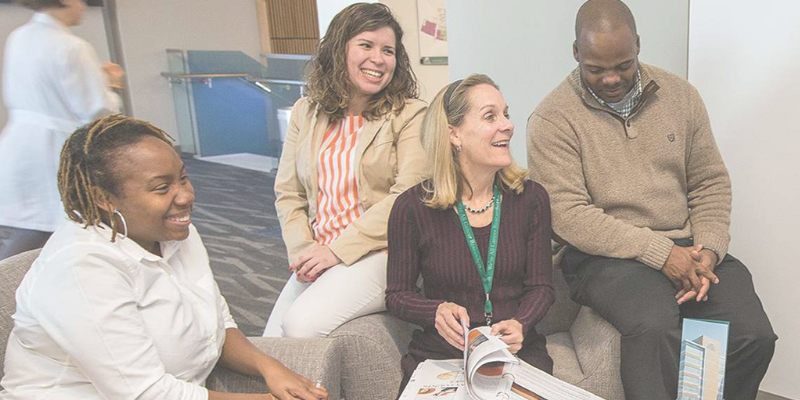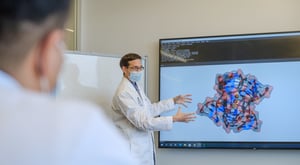Addressing Cancer Disparities: Creating the Community & Cancer Science Network
October 28, 2021 Posted by AHW Endowment

It’s nearly impossible today to find someone whose life has not been impacted by cancer in some way – it might be someone they know fighting a cancer battle, or even their own life-changing diagnosis. While decades of research, innovation, and prevention efforts have resulted in life-saving improvements in diagnosis, care, and survivorship, thousands of families still lose a loved one to cancer each year.
Yet while mortality rates are declining nationally, cancer remains a leading cause of death and some groups of people experience a higher burden of cancer incidence and mortality. In Wisconsin, the disproportionate impact of cancer is startling.
Wisconsin has the nation’s second largest Black–White disparity in lung cancer mortality, and the Milwaukee metropolitan area has the largest Black–White disparity in lung cancer mortality among metropolitan areas nationwide. Additionally, Wisconsin has the nation’s third largest Black–White disparity in female breast cancer mortality. Alongside differences by race and ethnicity, geographic mapping led by the MCW Division of Epidemiology has identified disparities in mortality of twice the expected rate in some areas of the state.
Today, through a multi-year, nearly $10 million AHW investment, a broad coalition of partners called the Community and Cancer Science Network (CCSN) is convening community organizations and academic medicine researchers to identify innovative solutions to address these disparities.
While the project’s aims are stated simply – to eliminate cancer disparities – addressing the complexities of the root causes contributing to these issues require a thoughtful, multi-faceted approach that take into consideration a variety of factors and needs.
The Community and Cancer Science Network grew out of an innovative developmental phase originated by AHW, which brought together a team of experts from community organizations and academic medicine to develop a deeper understanding of Wisconsin’s breast and lung cancer disparities and propose solutions.
“AHW provided the foundation for CCSN. It allowed a team to look at cancer disparities from many different perspectives and use that understanding to propose solutions, which include three initiatives coordinated by a central body known as the Integration Hub,” said Jenelle Elza, RN, strategic partnerships manager at the American Cancer Society and community co-PI for the CCSN Integration Hub.
“We’re seeing the impact within organizations and structures. Our peers from across the state are looking to us because they’re hungry to do something different.” - Kim Kinner
In its initial year, the CCSN Integration Hub established a full advisory team, built developmental evaluation capacity, and identified community and academic leaders who would collaboratively shape proposals for impacting three key areas identified as needing focus: a pilot curriculum for community members and early-career biomedical researchers to address issues of mistrust and misunderstanding, understanding the role of mammographic quality in breast cancer disparities, and supporting multi-sector collaborative workgroups focused on furthering the work around critical issues of cancer disparities.
“The idea behind the integration hub is to build collaborative infrastructure across the state,” said Dr. Melinda Stolley, Anne E. Heil Professor of Cancer Research, Professor of Medicine, and associate director of cancer control and prevention at the Medical College of Wisconsin, who is the initiative’s academic Co-PI . “This initiative provides that environment; a structure and framework to do this work together and create sustainable solutions that can be applied to other focal areas in the future.”
In 2020 and 2021, the network launched its initiatives to address each of these areas. Supported by $4.8 million in AHW investment, the initiatives are bringing together the efforts of the world-renowned MCW Cancer Center with the expertise and experience of Wisconsin-based organizations including the Wisconsin Women’s Health Foundation, Center for Urban Population Health, House of Grace, Kingdom Ministries, the Wisconsin Women’s Health Foundation, the Wisconsin Cancer Collaborative and more.
A Research and Community Scholars Program has formed its inaugural class aimed at building a generational change in how medical mistrust and misunderstanding is approached.
A Mammographic Quality Project, whose team is growing to include partners from across the state, is examining whether mammography imaging, interpretation, and follow-up quality are influencing breast cancer disparities in Wisconsin while working to develop local and regional collaborative teams to sustain quality metrics.
The Collaborative Work Group initiative is working to build teams of diverse community and academic perspectives who will develop and implement integrated approaches addressing Wisconsin’s breast and lung cancer disparities. The teams will learn together, create collectively, and overcome issues of trust and power imbalances.
The Integration Hub recognizes that in addressing the complexities of cancer, tangible results may not be seen in health outcomes for years.
“Our wins are different than a traditional initiative,” said Kim Kinner, MA, senior director of cancer control partnerships at the American Cancer Society and community co-PI for the CCSN Integration Hub. “We’re seeing the impact within organizations and structures. Our peers from across the state are looking to us because they’re hungry to do something different.”
It's the foundation for innovation that has promise to impact the health of Wisconsinites for generations to come.
Find more information about these funded projects in the AHW Funded Project Listing.




